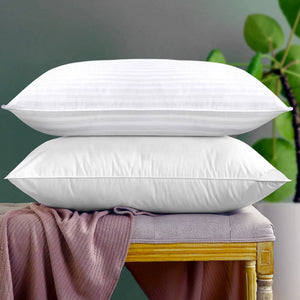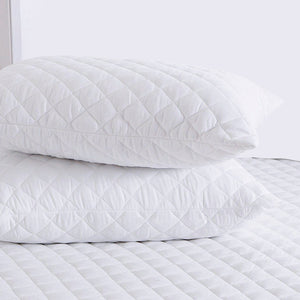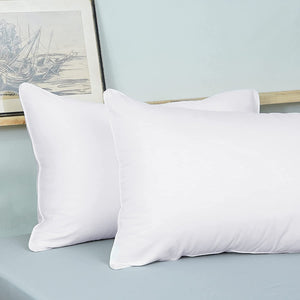Can Anti-Snore Pillows Help You Sleep Better? Find Out Here
Snoring is a problem many of us have experienced, either personally or through a partner. The disruptive sound can range from a gentle hum to a full-on roar, often leading to sleepless nights and groggy mornings. But snoring isn’t just an annoyance; it can be a sign of underlying health issues, such as sleep apnea.
This is where anti-snore pillows come into play. These specially designed pillows claim to alleviate snoring by promoting better breathing and proper sleep posture. But do they work? This blog will explore the world of anti-snore pillows, their benefits, and whether they can help you sleep better.
What Are Anti-Snore Pillows?
Anti-snore pillows are innovative sleep aids designed to reduce or eliminate snoring. Unlike regular pillows, which simply support your head and neck, anti-snore pillows are crafted to encourage optimal airway alignment. This alignment helps prevent the collapse or restriction of the airway, which is a common cause of snoring.

These pillows come in various shapes, sizes, and materials, each targeting snoring uniquely. The concept behind anti-snore pillows is simple: by adjusting the position of your head, neck, and shoulders, the pillow helps keep your airway open, reducing the vibrations in the throat that cause snoring. But how do these pillows differ from those we use every night?
How do Anti-Snore Pillows Differs from Regular Pillows?
Regular pillows are designed with general comfort in mind. They provide a soft or firm surface for your head, allowing you to rest in your preferred position. However, they do not account for the specific needs of those who snore. In contrast, anti-snore pillows are engineered with a purpose—to minimise snoring by promoting better airway alignment.

- Design and Shape: Anti-snore pillows often have a contoured design, featuring curves and dips that cradle the head and neck and keep the airway open. On the other hand, regular pillows are typically flat or only slightly curved, lacking the targeted support needed to reduce snoring.
- Material: While regular pillows can be filled with anything from feathers to synthetic fibres, anti-snore pillows are often made from memory foam or other materials that conform to your head and neck shape. This helps maintain the necessary alignment throughout the night.
- Functionality: Some anti-snore pillows have built-in technology, such as sensors that automatically detect snoring and adjust the pillow’s position. Regular pillows lack this functionality and are not designed with snoring in mind. Shop Bounce Back Pillows at Yorkshire Bedding.
Types of Anti-Snore Pillows
Not all anti-snore pillows are created equal. One type might be more effective depending on your snoring habits, sleeping position, and personal preferences. Let’s take a closer look at the different types available.
Memory Foam Anti-Snore Pillows

Memory foam pillows have become increasingly popular due to their ability to conform to your head and neck shape. Memory foam anti-snore pillows take this further by incorporating contoured designs that help maintain the correct posture for reducing snoring. The foam provides consistent support, keeping your airway open by preventing your head from tilting too far back or forward. Shop Hotel Pillows at Yorkshire Bedding.
Adjustable Anti-Snore Pillows

Adjustable anti-snore pillows are highly versatile. They allow you to customise the height and firmness by adding or removing inserts. This adjustability is particularly beneficial for individuals who switch sleeping positions throughout the night. Modifying the pillow’s thickness can ensure that your head and neck remain aligned, reducing the likelihood of snoring.
Wedge-Shaped Anti-Snore Pillows

Wedge-shaped pillows are designed to elevate your upper body, which can help reduce snoring by preventing your airway from collapsing. The incline created by the wedge encourages better airflow, particularly for back sleepers. Wedge-shaped pillows can also be helpful for those who suffer from acid reflux, as the elevation prevents stomach acid from travelling up the oesophagus.
Contour Anti-Snore Pillows

Contour pillows feature a unique, wave-like design that supports the natural curve of your neck. This type of pillow is particularly effective for side sleepers, as it helps keep the spine aligned and prevents the chin from tucking into the chest—two factors that can contribute to snoring. Contour anti-snore pillows provide consistent support throughout the night, reducing the chances of airway obstruction.
Anti-Snore Pillows with Built-in Technology
Some anti-snore pillows have built-in sensors and technology for those seeking a high-tech solution. These pillows can detect snoring sounds and automatically adjust their position to open the airway. Some models even connect to apps that track your sleep patterns, offering insights into the pillow's effectiveness and overall sleep quality. Shop Quilted Pillows at Yorkshire Bedding.
How Anti-Snore Pillows Improve Sleep Quality?
The primary goal of anti-snore pillows is to reduce snoring, but their benefits extend beyond that. These pillows can enhance your overall sleep quality by improving the alignment of your head, neck, and shoulders. Here’s how:
Enhanced Breathing and Airflow
One of the most significant advantages of anti-snore pillows is their ability to enhance breathing. Snoring is often caused by a partial airway blockage, which restricts airflow and leads to vibrations in the throat. By keeping the airway open, anti-snore pillows allow smoother, more consistent breathing throughout the night. This reduces snoring and ensures you get enough oxygen, leading to more restful sleep.
Promoting Proper Sleep Posture
Your sleep posture plays a crucial role in your overall health. Poor spine and neck alignment can lead to discomfort, restless sleep, and chronic pain. Anti-snore pillows are designed to promote proper sleep posture by supporting the natural curve of your spine. Whether you sleep on your back, side, or stomach, these pillows help keep your body in a position that minimises strain and maximises comfort.
Reducing Sleep Disruptions
Snoring can be a significant source of sleep disruption, not just for the person snoring but also for anyone sharing the bed. Anti-snore pillows can reduce or eliminate these disruptions by addressing the root cause of snoring. By ensuring that your airway remains open and unobstructed, these pillows help you—and anyone else in the room—enjoy a more peaceful, uninterrupted night’s sleep.
Potential Impact on Sleep Apnoea
Sleep apnea is a severe condition in which breathing repeatedly stops and starts during sleep. While anti-snore pillows do not cure sleep apnea, they can help manage mild cases by keeping the airway open. This can reduce the frequency and severity of apnea episodes, leading to better sleep quality and a lower risk of related health issues.
Who Can Benefit from Anti-Snore Pillows?
Not everyone who snores will benefit from an anti-snore pillow, but many people can find relief. Understanding who can benefit from these pillows requires looking at the common causes of snoring and the specific needs of different sleepers.
Identifying Common Snoring Causes
Snoring can result from a variety of factors, including:
- Obstructed Nasal Airways: Allergies, colds, or a deviated septum can cause nasal congestion, leading to snoring.
- Poor Muscle Tone: The muscles in the throat and tongue can relax too much during sleep, causing them to collapse and block the airway.
- Obesity: Excess weight, particularly around the neck, can contribute to snoring by narrowing the airway.
- Sleep Position: Sleeping on your back can cause the tongue and soft palate to collapse to the back of the throat, leading to snoring.
- Age: As we age, the muscles in our throat naturally weaken, making snoring more likely.
Suitable Candidates for Anti-Snore Pillows
An anti-snore pillow could be effective if your snoring is caused by poor muscle tone, sleep position, or mild nasal congestion. These pillows are particularly beneficial for:
- Back Sleepers: People who sleep on their backs are more prone to snoring because gravity causes the tongue to fall back into the throat. Anti-snore pillows designed for back sleepers can help keep the airway open.
- Side Sleepers: Side sleeping is generally better for reducing snoring. However, an anti-snore pillow can provide additional support to keep the spine aligned and prevent the chin from tucking into the chest.
- People with Mild Sleep Apnoea: While anti-snore pillows are not a substitute for medical treatment, they can help manage symptoms in people with mild sleep apnoea by reducing airway obstruction.
Assessing Snoring Severity and Pillow Effectiveness
The effectiveness of an anti-snore pillow can vary depending on the severity of the snoring. These pillows can significantly affect those with mild to moderate snoring. However, if your snoring is caused by more serious conditions like severe sleep apnoea or a deviated septum, an anti-snore pillow alone may not be enough. In such cases, it’s essential to consult a healthcare professional for a comprehensive treatment plan.
How to Choose the Right Anti-Snore Pillow?

Choosing the right anti-snore pillow can be a game-changer for your sleep quality, but with so many options on the market, it can be challenging to know where to start. Here are some factors to consider when selecting an anti-snore pillow:
- Sleeping Position: Consider your preferred sleeping position. Different pillows cater to back, side, or stomach sleepers, so choose one that complements your natural posture.
- Material: The pillow's material can affect its comfort and effectiveness. Memory foam is popular because it can conform to your shape, but some people prefer the feel of latex or other materials.
- Adjustability: An adjustable pillow might be the best choice if you’re unsure about the ideal height or firmness. This allows you to customise the pillow to suit your needs.
- Size and Shape: Anti-snore pillows come in various sizes and shapes, from standard rectangular pillows to wedge-shaped designs. Choose a size that fits your bed and sleeping habits.
- Built-In Features: Some pillows offer additional features like cooling gel layers, anti-allergy covers, or even built-in technology. Consider these extras if they align with your specific needs.
- Budget: Anti-snore pillows vary widely in price. Set a budget you’re comfortable with, but remember that investing in a high-quality pillow can benefit your sleep health.
Final Thoughts on Anti-Snore Pillows and Their Impact on Sleep
Anti-snore pillows offer a practical, noninvasive solution for those struggling with snoring. By improving sleep posture and ensuring that your airway remains open, these pillows can help reduce snoring and enhance overall sleep quality. While they may not work for everyone—particularly those with severe sleep apnea—they can be an effective tool for many people. If snoring keeps you or your partner awake, an anti-snore pillow might be worthwhile.
FAQs
Do Anti-Snore Pillows Work?
Anti-snore pillows can be effective for many people, especially those with mild to moderate snoring caused by sleep position or poor airway alignment. However, results can vary and may not be as effective for severe snoring or sleep apnea.
How Long Does It Take to Notice Results?
Some people notice an improvement in snoring within the first few nights of using an anti-snore pillow. For others, seeing noticeable results may take a week or two as their bodies adjust to the new sleeping position.
Can Anti-Snore Pillows Cure Sleep Apnoea?
Anti-snore pillows are not a cure for sleep apnea. They may help manage mild cases by keeping the airway open, but they are not a substitute for medical treatment. If you suspect you have sleep apnea, it’s essential to consult a healthcare professional.
Are There Any Side Effects of Using Anti-Snore Pillows?
Most people do not experience side effects from using an anti-snore pillow. However, getting used to the new shape and firmness may take some time. If the pillow is not supportive enough, it could lead to neck or shoulder discomfort.
How Do I Clean and Maintain My Anti-Snore Pillow?
Cleaning and maintaining your anti-snore pillow depends on the material. Memory foam pillows usually have removable, washable covers, but the foam should not be washed. Other types of pillows may be machine washable. Always check the manufacturer’s instructions for proper care.







